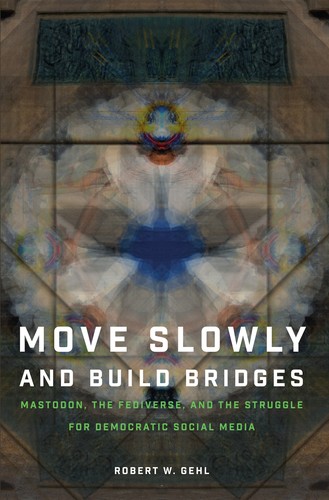Remy Rose wants to read Anarchy Works by Peter Gelderloos

Anarchy Works by Peter Gelderloos
Anarchism is the boldest of revolutionary social movements to emerge from the struggle against capitalism, it aims for a world …
She/they. I like knitting, math, and uplifting the proletariat.
This link opens in a pop-up window

Anarchism is the boldest of revolutionary social movements to emerge from the struggle against capitalism, it aims for a world …

Move Slowly and Build Bridges tells the story of activists, software developers, artists, and everyday people who have built the …

Some of Ben Sedgwick’s favorite things:
I don't have a ton of thoughts about this book other than it being pretty good. The "metamagic" concept was really clever, honestly much more inspired than anything happening in the works being parodied here. The spicy parts were very hot. There were fewer of them than I was expecting, but definitely the right amount. It's a fairly personal story with relatively small stakes, more in line with the average romance than the average fantasy. That probably makes sense for book 1 of a series though. It does a great job establishing the world's rules, which are pretty intriguing. I'd love to read a followup with a grander, more far-reaching plot.
We will build a socio-political infrastructure to intervene in every area of Black life: food and housing cooperatives, Black Liberation schools, people’s banks and community mutual aid funds, medical clinics and hospitals, rodent control and pest extermination programs, cooperative factories, community cultural and entertainment centers, the establishment of an intercommunal electronic communications network, land and building reclamation projects, public works brigades to rebuild the cities, youth projects, drug clinics and many other such programs.
— Anarchism and the Black Revolution by Lorenzo Kom’boa Ervin
Emphasis mine. I probably spend way too much time on the Fediverse. And people on the Fediverse tend to talk about the Fediverse, a lot. In the grand scheme of "things that need to be expropriated and decentralized", I often feel like the other stuff in Ervin's list here are not being prioritized highly enough, in comparison.
However, the fact that he mentions electronic communications in this book at all (first published in 1979) reminds me that it is actually important to do. When I feel like the Fediverse discourse is getting way into its own head, I should remember that the big mainstream platforms are all trying to orchestrate right-wing coups and shit. Building a good replacement probably does take the exact kind of dedicated people I see in my timeline, and we're seriously not even close to finished yet. I bet Ervin might like the idea of Oliphant's …
Emphasis mine. I probably spend way too much time on the Fediverse. And people on the Fediverse tend to talk about the Fediverse, a lot. In the grand scheme of "things that need to be expropriated and decentralized", I often feel like the other stuff in Ervin's list here are not being prioritized highly enough, in comparison.
However, the fact that he mentions electronic communications in this book at all (first published in 1979) reminds me that it is actually important to do. When I feel like the Fediverse discourse is getting way into its own head, I should remember that the big mainstream platforms are all trying to orchestrate right-wing coups and shit. Building a good replacement probably does take the exact kind of dedicated people I see in my timeline, and we're seriously not even close to finished yet. I bet Ervin might like the idea of Oliphant's "Archipelago" thingy, if he doesn't know about it already.
Of course, the original sentiment coming from 1979, this probably presages mesh networks and municipal broadband more than it does federated social media. How cool would it be to access one over the other though??

In the universe of breads, salt rising bread stands alone. There is nothing else remotely like it, in flavor, personality …
This short course in anarchism did not stick, however, even though I greatly respected Sostre, because I did not understand the theoretical concepts and associated them with white radicals. I just could not believe any society could exist without a central government, politicians and a bureaucracy. I guess I was like most people who hear this for the first time.
— Anarchism and the Black Revolution by Lorenzo Kom’boa Ervin

First published in Portuguese in 1968, Pedagogy of the Oppressed was translated and published in English in 1970. Paulo Freire's …
This phenomenon, in addition to their class position, perhaps explains why so many professionals adhere to anti-dialogical action. Whatever the specialty that brings them into contact with the people, they are almost unshakably convinced that it is their mission to “give” the latter their knowledge and techniques. They see themselves as “promotors” of the people. Their programs of action (which might have been prescribed by any good theorist of oppressive action) include their own objectives, their own convictions, and their own preoccupations. They do not listen to the people, but instead plan to teach them how to “cast off the laziness which creates underdevelopment.” To these professionals, it seems absurd to consider the necessity of respecting the “view of the world” held by the people.
Ouch! As someone who works in a public library makerspace, this hits a little too close for comfort... I do try to just empower the patrons to do whatever it is they already want to do, using the equipment at our disposal. But... I can't deny I also silently judge them for making things that I think are "silly" or wasteful. And I definitely have a lot of my training for the equipment memorized down to a script, too.
It happens that peace cannot be bought; peace is experienced in solidarity and loving acts, which cannot be incarnated in oppression.